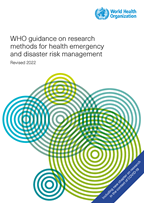- Home/
- Our Work/
- Health Emergencies/
- Research Methods/
- Sections and chapters/
- Section 5: Special topics to demonstrate research processes and benefits/
- Chapter 5.3 Refugees and internally displaced populations
Section 5: Special topics to demonstrate research processes and benefits
Chapter 5.3 Refugees and internally displaced populations

Research Methods for Health EDRM
Section navigation
- Section 5: Special topics to demonstrate research processes and benefits
- Chapter 5.3 Refugees and internally displaced populations
- Chapter 5.1 Disaster mental health research
- Chapter 5.2 Crowdsourcing to gather data
- Chapter 5.4 Indigenous peoples
Authors: Saad A, Pottie K, Chiu CP.
Chapter 5.3 describes the following key aspects of research with refugees and Internally Displaced Persons (IDPs):
- The nature and characteristics of refugees and IDPs.
- Ethical concerns surrounding migration research and approaches to address these.
- Linguistic and cultural challenges facing refugees and the critical role of interpreters when conducting research or providing care.
- Mental health issues of refugees and IDPs in different settings and appropriate and ethical research methods to address their needs.
- Importance of evidence-based interventions to properly manage acute conditions and the challenges of conducting research among refugees or IDPs with acute conditions.
What is this chapter about?
Research protocols must be well designed to reflect the logistical and ethical challenges of conducting research among refugees and IDPs. Understanding research methods to capture these populations’ unique health and support needs can help build the evidence base for Health Emergency and Disaster Risk Management (Health EDRM). This chapter outlines how the characteristics of refugees and IDPs need to be considered in research that will involve them. It describes four specific topics to consider when designing such research: humanitarian ethics, language and interpretation, mental health, and acute care.
Case studies presented in the chapter:
- Example of important cultural issues in a project with Syrian refugees in Lebanon.
- Use of a systematic review to assess psychosocial services and programmes for refugees and IDPs.
- Rapid needs assessment surveys to identify acute health needs in refugees and IDPs.
What are the key messages of this chapter?
- Researchers need to consider population-specific ethical concerns when conducting research among refugees or IDPs, such as obtaining a comprehensive informed consent.
- The linguistic barriers that refugees face require the services of interpreters when providing care or conducting research. Researchers need to acknowledge the confidentiality challenges and cognitive biases that may arise when using interpreters and work to overcome them.
- Refugees and IDPs are at a disproportionately higher risk of psychiatric disorders. Mental health research among these vulnerable populations is challenging and requires ethical research methods.
- Efficient management of acute care conditions among refugees and IDPs requires evidence-based research. Researchers should be transparent when planning their research and should have sound communication skills to explain its nature to refugees and IDPs.
